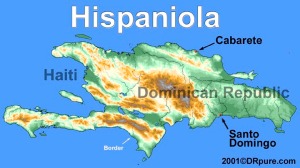First, let me acknowledge Henna, Cold Spaghetti, Island Meri, and Steven for their recent comments. I appreciate your thoughts.
Second, let me segue from thanks to apologies. Specifically, I may owe one to Sammy Sosa.
In a recent post, I wrote about Sosa’s apparent use of a skin product designed to make him appear whiter. I wondered if the baseball great’s light skin was a capitulation to the colonizer mentality. This mindset holds that anything white is superior, and it has caused many black people to go to absurd lengths to seem whiter (both culturally and literally).
As we know, Hispanics can be of any race. Sosa, a Dominican, is obviously a dark-skinned Latino. Many people have wondered if he is trying to renounce his Hispanic and/or black status.
As it turns out, maybe Sosa isn’t to blame if he wants to be white. Apparently, some of the man’s fellow players think that he is not really black in the first place.
Specifically, Angels outfielder Torii Hunter, a great player and multiple All-Star, believes that black players from Latin America are “imposters.” Hunter said that he and his fellow African American players “have a theory that baseball can go get an imitator and pass them off as us. It’s like they had to get some kind of dark faces, so they go to the Dominican or Venezuela because you can get them cheaper. You can get a Dominican guy for a bag of chips.”
I must admit that I didn’t know the rates for Dominicans were so reasonable. Perhaps we should all get one.
Hunter goes on to pose the ultimate rhetorical question about a former MVP. Hunter asks, “Hey, what color is Vladimir Guerrero? Is he a black player? Come on, he’s Dominican. He’s not black.”
I have no idea if Guerrero considers himself black. Perhaps he answers, “Hispanic” or “Dominican” or “human” or “right-handed slugger” when asked about his status. But he’s certainly within his rights to say, “black” or “black Latino.”
In the picture below, Hunter is on the left. Guerrero is on the right. One of them is positively not black.

Perhaps Hunter meant that Guerrero and other players from Latin America are not African American. That’s a noncontroversial point. However, Hunter comes across as a cultural jingoist, reminiscent of people who said President Obama is not really black.
His comments bring up the whole messy topic of how we categorize race and ethnicity, and why. I’ve written before about this, and several readers have chastised me for (among other offenses) saying that Chicanos are Hispanic and Spaniards are not. I’d like to think, however, that I was a bit more diplomatic than Hunter.
Perhaps we are indeed all too hung up on race and who is one category and who is not. But to deny that these constructs – artificial as they are – actually exist is to deny their power. And that’s why, despite the earnest pleas of many Americans, we will go on talking about race and racial matters.
As for Hunter, he has claimed that his comments were taken out of context. If so, it lessens the creepiness of their content, but not the stupidity of their mere existence.
Hunter ended his racial-conspiracy rant by saying, “I’m telling you, it’s sad.”
Oh, it’s sad, alright. But not in the way that Hunter thinks. It’s sad that he said, “They’re not us” when referring to teammates like Guerrero.
As the baseball writer Craig Calcaterra points out, “the fact that more and more of baseball’s black players happen to come from a couple hundred miles south of an artificial political border doesn’t mean that there is no one around to receive the torch passed down from Jackie Robinson.”
In fact, many of those players who thrive under Robinson’s legacy are Hispanic. And yes, they may even be black too.








